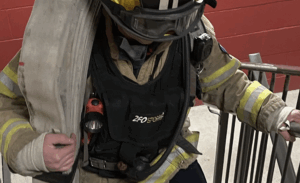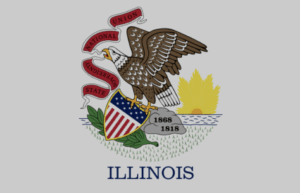The firefighter background investigation has been a crucial part of the hiring process for decades, ensuring that candidates meet the high standards for this challenging profession.
Why Read Our Blog on the Firefighter Background Investigation:
- Insider Insights: Gain valuable insights into what background investigators seek and how to prepare effectively.
- Learn from real-life success stories of candidates who successfully navigated the background investigation process.
Discover how to navigate the critical firefighter background investigation process and secure your path to this noble profession. This article’ll delve into the essential aspects of a firefighter’s background investigation and why it’s crucial.
Table of Contents
Learn How You Can Become A Firefighter

Mastering the Firefighter Exam is a complete guide on how to pass the firefighter exam with a top score. It simplifies the complicated hiring practices of big city fire departments and reveals insider information most candidates don’t know about.
If You Would Like To Know How To Get A Head Of Your Competition, This Book Is For You.
The Purpose of Firefighter Background Investigations
A comprehensive firefighter background investigation is an integral part of the recruitment process to ensure that the brave men and women who join the firefighting ranks are well-equipped and trustworthy.
A firefighter’s role demands courage, physical fitness, and the ability to make quick decisions under extreme pressure. Therefore, it’s essential to assess candidates’ character, history, and qualifications to ensure they are suitable for this demanding profession.
The Background Investigation Includes:
- Criminal History Check: One of the primary objectives of a firefighter’s background investigation is to conduct a thorough criminal history check. This helps identify past convictions that may disqualify a candidate from the role, as firefighters must be trusted to act with integrity and uphold the law.
- Employment History: The investigation also examines a candidate’s employment history. It’s crucial to verify the accuracy of their work experience and assess how well their previous roles align with the demands of firefighting. Employers may contact previous workplaces to gather insights into the candidate’s work ethic and reliability.
- Financial Background: A firefighter’s background investigation often includes a review of their financial history. While more than financial challenges is needed to disqualify a candidate, extreme financial instability could raise concerns about their ability to handle the financial responsibilities of the job.
- Character References: Character references play a vital role in a firefighter’s background investigation. These references provide insight into the candidate’s personality, ethics, and suitability for the role. Fire departments typically contact these references to gain a more comprehensive understanding of the candidate.
- Education and Certifications: Confirming a candidate’s educational background and certifications is essential. Firefighters require specific training and education to perform their duties effectively and safely. The investigation ensures that candidates meet these educational and training requirements.
The Importance of Transparency
Candidates applying for firefighter positions must be completely transparent during the background investigation. Any omission of relevant information or attempts to conceal past issues can be grounds for disqualification. Honesty and integrity are core values in the firefighting profession, starting with the application process.
For more about the fire department application process go to: The Fire Department Hiring Process or Firefighter Hiring Requirements and Preferences Explained.
What Can You Do to Prepare for The Background Investigation?
Hold Yourself to a Higher Standard: In the firefighter profession, maintaining the highest standards of conduct is non-negotiable. Always strive to exceed expectations and showcase your dedication to excellence.
Build a Reputation for Honor and Integrity: Aspire to be known as someone with unwavering honor and integrity in your community. Your reputation should reflect trustworthiness and a commitment to ethical behavior.
Steer Clear of Trouble: Avoid getting entangled in any situation that could tarnish your record or reputation. Demonstrating good judgment and sound decision-making is paramount.
Mind Your Social Media Presence: Be mindful of your online presence, especially on social media platforms. Delete or privatize any content that could be seen as controversial or unprofessional, as it can impact your image and employability.
Safeguard Your Reputation: Your reputation is one of your most valuable assets. Protect it by consistently upholding high moral and professional standards on and off duty.
Embrace a Clean Lifestyle: Firefighters must maintain a clean and healthy lifestyle. This includes staying physically fit, avoiding substance abuse, and making choices promoting overall well-being.
These principles enhance your chances of success in the firefighter background investigation and contribute to your long-term success and credibility in the fire service.
Were You Contacted About the Firefighter Background Investigation?
If you’re contacted about a background screening or investigation, it likely means you have passed all the testing processes so far and are being evaluated for final consideration. Firefighter background investigations cost the city precious dollars, so they will only want to conduct investigations on final candidates – usually, those who have scored high on the eligibility list.
The interview panel will evaluate your past and character during the background investigation. You don’t want them to uncover something unbecoming of a firefighter. If you want to be a firefighter, a community pillar, you must behave like a firefighter.
4 Common Components of a Firefighter Background Investigation:
Fingerprinting
The Background Packet
The Polygraph Test
The Psychological Exam
1. Fingerprinting
Most fire departments include fingerprinting as part of the background investigation for prospective applicants. DNA fingerprinting is a laboratory technique to establish links between biological evidence (your unique fingerprint) and crimes committed.
You will be fingerprinted and compared to fingerprints found in national criminal history records. Candidates with long criminal histories will not be considered.
Each fire department may handle fingerprinting differently:
- You must sign a consent form allowing the hiring authority to take your fingerprints.
- You will likely be asked to visit a specific site on a specific day and time.
- After you’ve been fingerprinted, the prints are plugged into a national database by the investigating authority (often the city’s police department).
- This process may screen out candidates found unsuitable for the position or conduct a discrepancy interview to review verification and allow an explanation of any issues found.
2. The Background Packet
You’ll be given a background packet of in-depth documents and asked to complete and return them by a given date. The hiring authority needs this information to conduct a thorough background investigation. The packet is typically around 30 pages long – and includes particular questions about:
Personal Information
- Full name
- Current address
- Contact details (phone, email)
- Citizenship
- Birthplace (city, county, state, country)
- Birthdate
- Social security number
- Driver’s license number
- Physical description (height, weight, hair, eye color)
Residency
- Addresses for the past ten years
- Dates of residency
- Ownership or rental status with contact info
- Names of cohabitants and their contact info
- Reasons for leaving previous residences (e.g., eviction, unpaid fees)
Employment History
- Dates of employment, departure, and reasons for leaving
- Job type, description, and title
- Supervisor contact information
Educational Background
- List of schools attended from pre-school to present, with dates.
- Degrees and certifications earned.
- Transcripts and GPAs
Military Experience
- Record of military service
Legal History and Driving Record
- Any legal history, driving record, tickets, and accidents.
Financial History
- Credit card history and outstanding debts
Associates
- Names and contact information of family members and friends.
Remember, background investigations can go back many years, so be prepared to provide detailed information about your history.
BONUS TIP: Start early. You’ll be surprised to find that you spend much more time compiling all the required information than you think you will. Typically, you’re given a relatively short amount of time to return the packet – maybe a week. It will take you that long, so consider collecting this data as soon as you finish the written and physical test. Don’t wait until the last minute to start on the forms.
3. The Polygraph Test (often called a lie-detector test)
The Employee Polygraph Protection Act of 1988 (EPPA) is a law that generally prevents employers from using polygraph (lie detector) tests, either for pre-employment screening or during employment.
However, the act does permit polygraph tests to be administered to certain applicants for a job with security concerns, and it does not cover federal, state, and local government agencies like the fire service.
As a result, you may be asked to take a polygraph as part of the background investigation.
The test is usually outsourced by the department to a third-party polygraph company and conducted by a trained polygraph analyzer.
A good polygrapher is skilled at getting honest answers, whether they are questioning suspects – or potential hires. Ultimately, their job is to see if you are lying and to eliminate those candidates that would be a detriment to the organization.
The two most common polygraph tests are:
- Computer voice stress analyzer (CVSA): Focuses on the instantaneous stress evident in FM frequencies in your voice – which cannot be consciously manipulated.
- Traditional polygraph: Measures delayed or downstream physiological indicators such as breathing, heart rate, and perspiration.
While there is controversy around the use of polygraphs and the accuracy of the test, it remains an integral part of many job assessment processes, including firefighters. Some tests are straightforward, while others may feel like a “mind game.”
Not every department implements a polygraph to assess candidates; those that don’t usually rely on a psychological evaluation.
BEST PRACTICES
- Stay calm and focused.
- Be professional in appearance.
- Concentrate only on the question you’re being asked.
- Only answer the questions you’re asked – don’t elaborate unless asked.
- Tell the truth.
- Don’t dodge questions about past mistakes you may have made. Own them and admit them if asked. (Everyone makes mistakes; you won’t be the only candidate who has to talk about past issues.)
- Eat before going to the test, and don’t take medications that might fog your head and impact your ability to focus.
- Don’t try to “beat the test.”
4. The Psychological Exam
A psychological exam is one of the last steps in the hiring process and includes a:
- Multiple-choice test
- One-on-one interview with a psychologist
1. Multiple-Choice Test
The test is long and tedious and can take hours to complete. It’s designed to exhaust a candidate with hundreds of multiple-choice questions, some similar but scattered throughout the test. The questions are relatively easy to answer, but the volume of similar questions and answers will play with your mind.
BEST PRACTICES
- Arrive early and block enough time to complete the test.
- Be honest with your answers. If you are less than truthful, inconsistencies
will reveal themselves – and those inconsistencies may be indicative of lying. - Don’t rush through your answers. It will only compound your anxiety level if you’re in a hurry to finish.
2. One-on-one Interview with a psychologist
Like it or not, the fate of your candidacy may rest in the hands of a psychologist.
The psychologist is not out to get you. However, it is their job to determine whether you are fit for duty and will make a good firefighter.
They qualify you for a job allowing you to enter an individual’s personal space and interact intimately. As a firefighter, you will be thrown into much more stressful situations than an interview with a psychologist.
The psychologist wants to rule out candidates who exhibit negative personal behaviors like a propensity to addiction (alcohol/drug), racist views (inequality), criminal intentions, and emotional instability, among others.
You will be asked questions based on the multiple-choice test you just completed, the background screening, and your overall lifetime experiences and philosophies.
BEST PRACTICES
- Be yourself and remain calm. You will be evaluated on your ability to stay calm under pressure (something you will need to do as a firefighter) and make
rational decisions. - Don’t get upset or angry. Even if you feel like the psychologist is pushing you or being aggressive to get a reaction out of you, don’t go there.
- Feel free to pause and think about how you want to answer before finally giving your response.
- Thank the psychologist at the end of the interview.
Concerned About Your Past?
Here’s the deal: There ARE some reasons a fire department will disqualify a candidate, such as a felony conviction, using illegal drugs, drug trafficking, stealing, and arson.
That said, the hiring authority understands that no one is perfect and everyone makes mistakes. A track record of problems (such as vehicle accidents or traffic tickets) will satisfy you. They may, however, make it harder for you to stand out positively.
Not every mistake you’ve made in your lifetime is fatal to your dream job. The fire department will be interested in how you handled yourself after the mistake.
Be honest about your mistakes – own them. Focus on how the mistake was a life-learning lesson for you. It says a lot about your character.
You can’t change the past, but you can start making changes that will affect your future.
Lying
One last time, DON’T do it.
Lying during any part of the hiring process, whether on your application, at the interview or during the background investigation, will likely be uncovered. Worse, you won’t convey the honesty and trust the fire department requires in an employee, especially one that intimately serves the community.
If you doubt your background record, contact the city’s Department of Human Resources and find out the specifics for automatic disqualification.
In Conclusion
A firefighter’s background investigation is a critical step in the recruitment process, designed to ensure that those entrusted with protecting lives and property are fit for the task. Fire departments can decide who should join their ranks by thoroughly examining a candidate’s criminal history, employment record, financial background, character references, education, and certifications.
Aspiring firefighters should approach the background investigation process with transparency, knowing that it is vital to establishing trust and ensuring that only the most qualified individuals become the heroes we rely on during emergencies.
Summary
If you’re contacted about the firefighter background investigation, it’s a great sign that you are being evaluated for final consideration and employment. The department will spend additional time and money determining if you’re a good fit for the job.
Pay close attention to the different components of the background investigation process. Make sure you follow instructions and time deadlines without exception.
Key Takeaways
- Start modeling the behavior required by a firefighter – integrity, high standards, and an asset to the community.
- Protect your reputation. Clear out anything controversial from your social media outlets or disengage from them completely.
- Start work on completing the background packet as soon as you get it.
- If you take a polygraph, stay calm and focused and concentrate only on the question you’re being asked.
- Be prepared for an extended psychological test. Answer questions honestly and rationally, stay relaxed, and avoid heated responses.
- Everyone makes mistakes; department authorities are more interested in how well you handle yourself after them.







